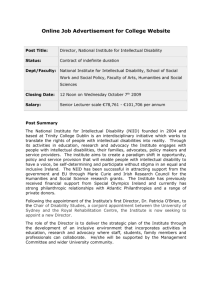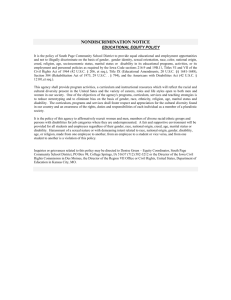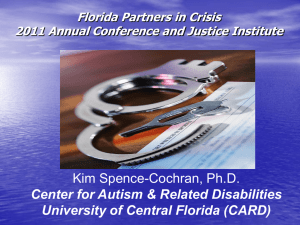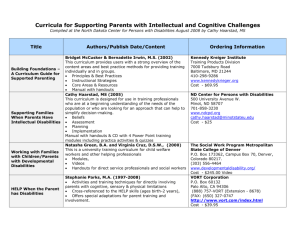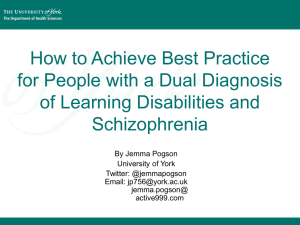Word - Advocacy For Inclusion
advertisement
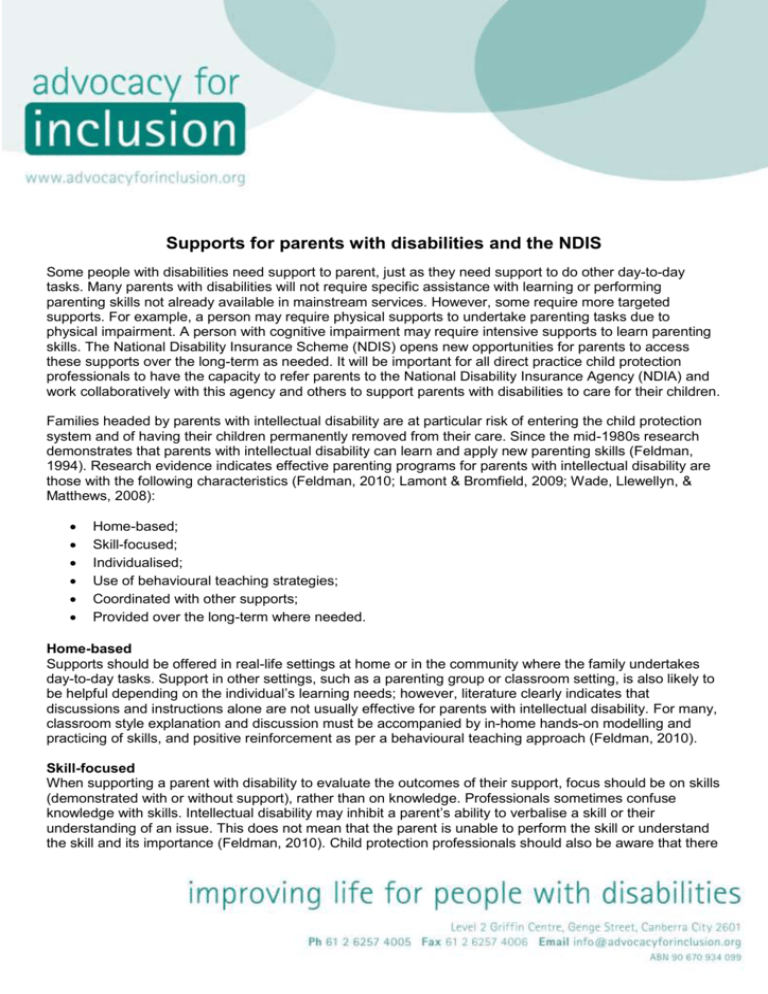
Supports for parents with disabilities and the NDIS Some people with disabilities need support to parent, just as they need support to do other day-to-day tasks. Many parents with disabilities will not require specific assistance with learning or performing parenting skills not already available in mainstream services. However, some require more targeted supports. For example, a person may require physical supports to undertake parenting tasks due to physical impairment. A person with cognitive impairment may require intensive supports to learn parenting skills. The National Disability Insurance Scheme (NDIS) opens new opportunities for parents to access these supports over the long-term as needed. It will be important for all direct practice child protection professionals to have the capacity to refer parents to the National Disability Insurance Agency (NDIA) and work collaboratively with this agency and others to support parents with disabilities to care for their children. Families headed by parents with intellectual disability are at particular risk of entering the child protection system and of having their children permanently removed from their care. Since the mid-1980s research demonstrates that parents with intellectual disability can learn and apply new parenting skills (Feldman, 1994). Research evidence indicates effective parenting programs for parents with intellectual disability are those with the following characteristics (Feldman, 2010; Lamont & Bromfield, 2009; Wade, Llewellyn, & Matthews, 2008): Home-based; Skill-focused; Individualised; Use of behavioural teaching strategies; Coordinated with other supports; Provided over the long-term where needed. Home-based Supports should be offered in real-life settings at home or in the community where the family undertakes day-to-day tasks. Support in other settings, such as a parenting group or classroom setting, is also likely to be helpful depending on the individual’s learning needs; however, literature clearly indicates that discussions and instructions alone are not usually effective for parents with intellectual disability. For many, classroom style explanation and discussion must be accompanied by in-home hands-on modelling and practicing of skills, and positive reinforcement as per a behavioural teaching approach (Feldman, 2010). Skill-focused When supporting a parent with disability to evaluate the outcomes of their support, focus should be on skills (demonstrated with or without support), rather than on knowledge. Professionals sometimes confuse knowledge with skills. Intellectual disability may inhibit a parent’s ability to verbalise a skill or their understanding of an issue. This does not mean that the parent is unable to perform the skill or understand the skill and its importance (Feldman, 2010). Child protection professionals should also be aware that there is often heavy emphasis on IQ scores and disability related deficits; however, these are poor indicators of parenting capacity (Lamont & Bromfield, 2009). Individualised Supports must be based upon the changing goals, values, and needs of each family. This means that each parent will have a highly tailored and flexible support arrangement. Support workers must get to know the parent and learn what teaching styles best suit them. Use of behavioural teaching techniques Behavioural teaching techniques include: modelling of skills by the support worker; supporting the parent to practice skills (without taking over); providing constructive corrective feedback (verbal and modelled); providing positive reinforcement; role playing; encouraging parent self-monitoring; use of pictures and videos as needed. Foundational to behavioural teaching techniques is a strengths based approach. The focus is on family strengths rather than on deficits. Challenges are addressed through a strengths focus. For example, ample use of positive reinforcement when the parent applies new skills or improved skills. This is done alongside careful and sensitive use of corrective feedback. Negative feedback should be used sparsely, only as necessary and in the context of using predominately positive feedback. This is based on research that people learn best through positive reinforcement. Coordinated with other supports Research shows that it is important for parents with disabilities to access broader supports that are not specific to parenting to contribute to their overall wellbeing; for example, assistance with arranging housing, transport and income assistance. A holistic approach is needed, where a range of supports are coordinated together for the entire family as an interrelated unit. Long-term Many parents with disabilities who come into contact with the child protection system will require parenting supports over the long-term. This is because disability is an ongoing experience and the support needs that come with it are also ongoing. It is highly important that child protection professionals are aware of this as it is sometimes mistaken that the parent is failing to make progress or is being non-complaint. Some people may require relatively constant support, some may require less support over time, and some people may require fluctuating support depending on their impairment (for example if they have a psychosocial disability). The NDIS opens new opportunities for parents to access intensive, targeted, supports over the long-term. References Feldman, M. (1994). Parenting education for parents with intellectual disabilities: A review of outcome studies. Research in Developmental Disabilities, 15(4), 299-332. Feldman, M. (2010). Parenting education programs. In G. Llewellyn, R. Traustadóttir, D. McConnell, & H. Bjög Sigurjónsdóttir, Parents with intellectual disabilities: Past, present and futures. West Sussex, UK: John Wiley & Sons Lamont, A., & Bromfield, L. (2009). Parental intellectual disability and child protection: Key issues. National Child Protection Clearing House, (31), 1-18. www.aifs.gov.au/nch/pubs/issues/issues31/issues31.html Wade, C., Llewellyn, G., & Matthews, J. (2008). Review of parent training interventions with parents with intellectual disabilities. Journal of Applied Research in Intellectual Disabilities, 21(4), 351-366. 2

